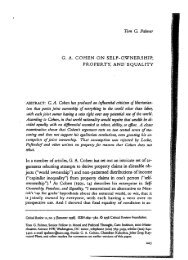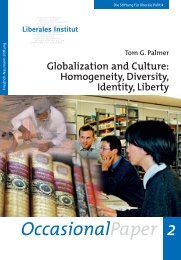Are Patents and Copyrights Morally Justified? - Tom G. Palmer
Are Patents and Copyrights Morally Justified? - Tom G. Palmer
Are Patents and Copyrights Morally Justified? - Tom G. Palmer
You also want an ePaper? Increase the reach of your titles
YUMPU automatically turns print PDFs into web optimized ePapers that Google loves.
i’io. 3j <strong>Are</strong> <strong>Patents</strong> <strong>and</strong> <strong>Copyrights</strong> <strong>Morally</strong>Jus4fied? 858<br />
The fact that a property right can be conceived as a bundle of<br />
rights to a thing indicates that one right among the many may<br />
be retained by the original producer, in this case, the right to<br />
reproduce the item. Just as a piece of l<strong>and</strong> may be sold, <strong>and</strong><br />
certain rights retained (easements, building restrictions, etc.),<br />
so all the rights to a mousetrap could be sold except one, the<br />
right to copy it. This argument is not novel, <strong>and</strong> was in fact<br />
criticized by Kant <strong>and</strong> Hegel.’ 38 The separation <strong>and</strong> retention<br />
of the right to copy from the bundle ofrights that we call property<br />
is problematic. Could one reserve the right, for example,<br />
to remember something? Suppose that I wrote a book <strong>and</strong> offered<br />
it to you to read, but I had retained one right: the right to<br />
remember it. Would I be justified in taking you to court if I<br />
could prove that you had remembered the name of the lead<br />
character in the book? Could the retention ofthe right to copy<br />
include the right to remember?<br />
Suppose that I had memorized the book <strong>and</strong> then spoke the<br />
words aloud to another. Would I be violating a retained right<br />
to the tangible object?’ 3 °What if I had heard another person<br />
recite the work <strong>and</strong> then wrote it down <strong>and</strong> published it?<br />
Would I be guilty of a violation of the creator’s property rights<br />
ofthe object, although it might face difficultiesin enforcing theclaimagainst someone<br />
who, say, recorded an illegally broadcast song or movie.<br />
138. Kant’s remarks deserve repeating: “Those who regard the publication of a<br />
book as theexercise of the rights of property in respect ofa single copy—it may have<br />
come to the possessor as a [manuscript] of the author, or as a work printed by some<br />
prior publisher—<strong>and</strong> who yet would, by the reservation of certain rights (whether as<br />
having their origin in the authoror in the publisher in whose favour he has denuded<br />
himselfof them), go on to restrict the exercise of property rights, maintaining the illegality<br />
ofreproduction—willnever attaintheir end. For the rights ofan author’regarding<br />
his own thoughts remain to him notwithst<strong>and</strong>ing the reprint; <strong>and</strong> as there cannot<br />
be adistinct permission given to the purchaserofa book for, <strong>and</strong>a limitation of, its use<br />
asproperty, how muchless is a merepresumption sufficient for such a weight ofobligation?”<br />
Kant, Lu/ira note 88, at 581. Hegel argues: “The substanceof an author’s or an<br />
inventor’s right cannot in the first instance be found in the supposition that when he<br />
disposes ofa single copy ofhis work, he arbitrarily makes it acondition that the power<br />
to produce facsimiles as things, a power which thereupon passes into another’s possession,<br />
should not becomethe property of theother but should remainhis own. The first<br />
question is whethersuch a separationbetweenownership ofthe thing <strong>and</strong>thepower to<br />
produce facsimiles which is given with the thing is compatiblewith the conceptofproperty,<br />
or whether it does not cancel the complete <strong>and</strong> free ownership on which there<br />
originally depends the option of the single producerof intellectual work to reserve to<br />
himself the power to reproduce, or to part with this power as a thing of value, or to<br />
attach no value to it at all <strong>and</strong> surrender it together with the single exemplar of his<br />
work.” C.. HEGEL, supra note 78, at 55.<br />
139. It is important to remember that the retained right involved is aright to control<br />
a tangibleobject. No claim is made to a direct right to own theideal object embedded<br />
in thetangible object. The control overthis ideal objectis an indirect consequence ofa<br />
property right overa tangible object.











